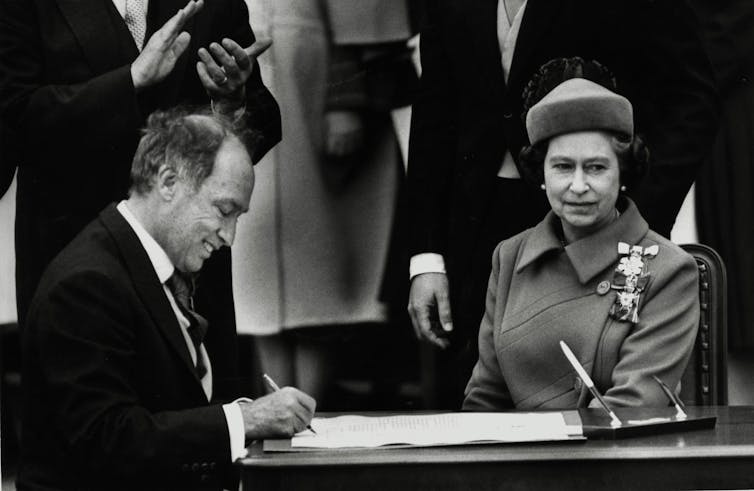Since President Donald Trump’s election there has been much discussion about the Canada-U.S. Safe Third Country Agreement. Under this agreement, asylum seekers at land border crossings are turned back to the United States without having their refugee claims heard in Canada.
The 2002 agreement only applies at official land border crossings. Thousands of asylum seekers who are already in the United States circumvent the agreement by crossing the Canadian border at irregular sites, including Roxham Road in Québec. Politicians continue to debate how to best respond.
The Liberal government wants to renegotiate an expanded agreement — though recent events suggest international negotiations with the U.S. are fraught with difficulties. It’s also safe to assume Trump will not agree to expand an international treaty preventing asylum seekers from leaving the U.S. for Canada.
The opposition Conservatives say Canada should unilaterally expand the agreement by declaring the entire U.S. border to be an official border crossing. This is a fantasy. Canada cannot send people to the United States without the U.S. agreeing any more than other countries can send people to Canada without permission.
The NDP proposes scrapping or suspending the agreement, arguing that the U.S. is no longer safe for refugees.
On this point, the New Democrats are supported by Amnesty International, the Canadian Civil Liberties Association and over 200 law professors across the country. But civil servants are worried this might increase the number of asylum claimants coming to Canada, straining the refugee determination system’s limited resources.
Illegal U.S. asylum policies
These political debates are now largely irrelevant. People can reasonably disagree about whether the agreement was ever good policy, but after a series of announcements by U.S. officials in recent weeks, the agreement cannot stand constitutional scrutiny in Canada.
As has been widely reported, the U.S. has instituted a policy of detaining asylum seekers and separating children from their families. This policy aims to discourage irregular migration. It is also illegal.
Read more: Chaos coming to Canada after U.S. decision on refugees
The policy violates international refugee law, which prohibits penalties on asylum seekers for irregular arrival. It violates international human rights law, which protects the integrity of the family. It violates international law relating to children, which requires the bests interests of children be considered when applying government policy and that children only be detained as a last resort.
Beyond being illegal, it’s also just plain wrong. Canada’s experience with the devastating intergenerational harms caused by the shameful removal of Indigenous children from their families offers a window into just how immoral this policy is.
If that wasn’t enough, the Trump administration announced on June 11 that refugees facing persecution due to domestic violence or gang violence will no longer receive asylum. Again, this leaves the U.S. in breach of international refugee law. It also conflicts with Canadian interpretations of refugee law.
Putting these announcements together, here is where we stand: some people who meet the refugee definition under Canadian law, if sent back to the U.S., are likely to be detained, separated from their children and deported to face persecution.
In this context, there is now no longer any question the agreement — at least as it is applied to refugees facing domestic violence or gang related violence — is unconstitutional under Canadian law.
Safe Third Country Agreement Unlawful
Regardless of political persuasion, no one who takes Canadian constitutional law seriously can contend Canada can lawfully send a person who meets the Canadian refugee definition to a country where they will be detained, separated from their children and then deported back to the country where they face persecution.

Indeed, it may not be possible for Department of Justice lawyers to even argue in court that the agreement is constitutional without breaching professional obligations as lawyers and civil servants. And any lawyers asked to do so should take a long hard look at the experience of others who have defended the undefendable elsewhere — such as lawyers who argued that torture was a lawful response to national security concerns or lawyers who defended apartheid in South Africa.
So there are now only two options. The government can take proactive measures and suspend or scrap the agreement — thereby restoring the orderly processing of refugees that existed prior to the agreement — or the government can wait for the courts to strike the agreement down as unconstitutional.
Prime Minister Pierre Trudeau gave Canada the Charter of Rights and Freedomsin 1982. Prime Minister Justin Trudeau must now decide whether his government will take steps to protect those rights or whether he will do nothing and make the courts do it for him.
Either way, the Canada-U.S. Safe Third Country Agreement is dead.
Author: Associate Professor, Osgoode Hall Law School, York University, Canada
Credit link: https://theconversation.com/u-s-canada-agreement-on-refugees-is-now-unconstitutional-98227<img src="https://counter.theconversation.com/content/98227/count.gif?distributor=republish-lightbox-advanced" alt="The Conversation" width="1" height="1" />


